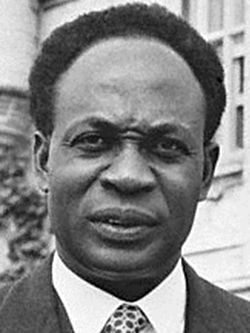
Cause of death: cancer
Francis Kwame Nkrumah (21 September 1909 – 27 April 1972) was a Ghanaian politician, political theorist, and revolutionary. He served as Prime Minister of the Gold Coast from 1952 until 1957, when it gained independence from Britain. He was then the first Prime Minister and then the President of Ghana, from 1957 until 1966. An influential advocate of Pan-Africanism, Nkrumah was a founding member of the Organization of African Unity (OAU) and winner of the Lenin Peace Prize from the Soviet Union in 1962.
After twelve years abroad pursuing higher education, developing his political philosophy, and organizing with other diasporic pan-Africanists, Nkrumah returned to the Gold Coast to begin his political career as an advocate of national independence. He formed the Convention People's Party, which achieved rapid success through its unprecedented appeal to the common voter. He became Prime Minister in 1952 and retained the position when Ghana declared independence from Britain in 1957. In 1960, Ghanaians approved a new constitution and elected Nkrumah President.
His administration was primarily socialist as well as nationalist. It funded national industrial and energy projects, developed a strong national education system and promoted a pan-Africanist culture. Under Nkrumah, Ghana played a leading role in African international relations during the decolonization period.
After multiple failed attempts on his life, coupled with increasingly difficult local economic conditions, Nkrumah's government became authoritarian in the 1960s, as he repressed political opposition and conducted elections that were not free and fair. In 1964, a constitutional amendment made Ghana a one-party state, with Nkrumah as president for life of both the nation and its party. He fostered a personality cult, forming ideological institutes and adopting the title of 'Osagyefo Dr.' Nkrumah was deposed in 1966 in a coup d'état by the National Liberation Council, under whose supervision the country's economy was privatized. Nkrumah lived the rest of his life in Guinea, where he was named honorary co-president.
Source : Wikipedia